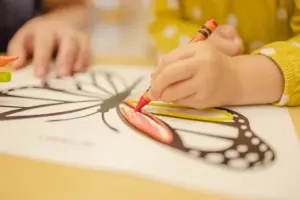
Why doesn't my child like to write?
Writing needs certain prerequisites. First comes balance, then accuracy, correctness and beauty....
Learn more easily and successfully!
Learning is an individual and creative process. How we deal with successes or failures in learning influences our interest in learning and our own growth. Parents and school shape this approach and have an influence on professional development.
As humans, we are curious by nature and want to develop ourselves further. Children continuously expand their scope of action and acquire their own knowledge through their curiosity.
The Evoped® creates more ease in learning through its interdisciplinary approach. Movement and sensory perception are the basis for stress-free learning, but these experiences are often missing in today's classrooms, preventing ease of learning or leading to more lasting challenges.

Starting school is the beginning of everything. With the aim of becoming valuable members of society, our children learn to deal with rules and regulations and to interact socially with their peers. They acquire basic skills such as reading, writing and arithmetic.
Learning problems in these early stages can lead to behavioral problems, which can have different causes. However, targeted interventions can solve these problems. Primary education forms the basis for a successful life and access to lifelong learning.

"Our brain is always learning. It does nothing better and can't do anything else! For a lifetime"
(Dr. Manfred Spitzer, psychiatrist, psychologist, university lecturer/University of Ulm)
This is really good news. Unfortunately, it stands in contrast to our school system and the daily perception of many pupils.
The transition from elementary school to lower school can be bumpy. Our children are faced with more complexity, a faster pace and more responsibility. As parents, we need to guide and monitor our children's progress as each child has their own pace.
Incorrect pencil position, writing too hard or writing too slowly automatically lead to stress. Our children need help with time management and dividing their work into small daily study sessions, which are more effective than long study sessions before exams.
Learning difficulties are as individual as a fingerprint. Learning didactics is not tutoring. Instead of simply teaching what needs to be learned, the focus is on finding the best strategy for overcoming learning obstacles.
Learning is individual. It is helpful to know your own learning type: visual, auditory, motor or communicative. With good guidance, the transition to independence is successful.

Phenomena related to learning include learning blocks, exam anxiety, excessive demands, lack of motivation or black-outs during exams. The more often you or your child experiences this, the more it manifests itself. A lack of self-confidence in one's own abilities develops.
"It is not the events that are essential, but what the brain makes of them" (L. Koneberg).
"Behind the stress lies the talent".
Ludwig Koneberg

Writing needs certain prerequisites. First comes balance, then accuracy, correctness and beauty....

Development means not only developing on the outside, but also on the inside and becoming ......

In Austria, more than 800,000 people find reading difficult. The foundation is laid at a young age....